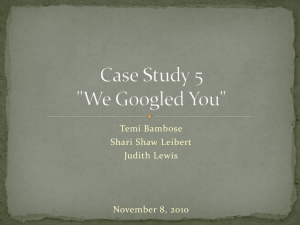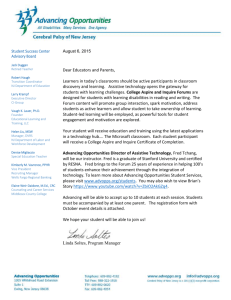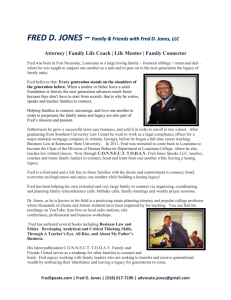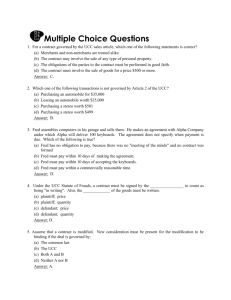We Googled You Hathaway Jones's CEO has found a promising
advertisement
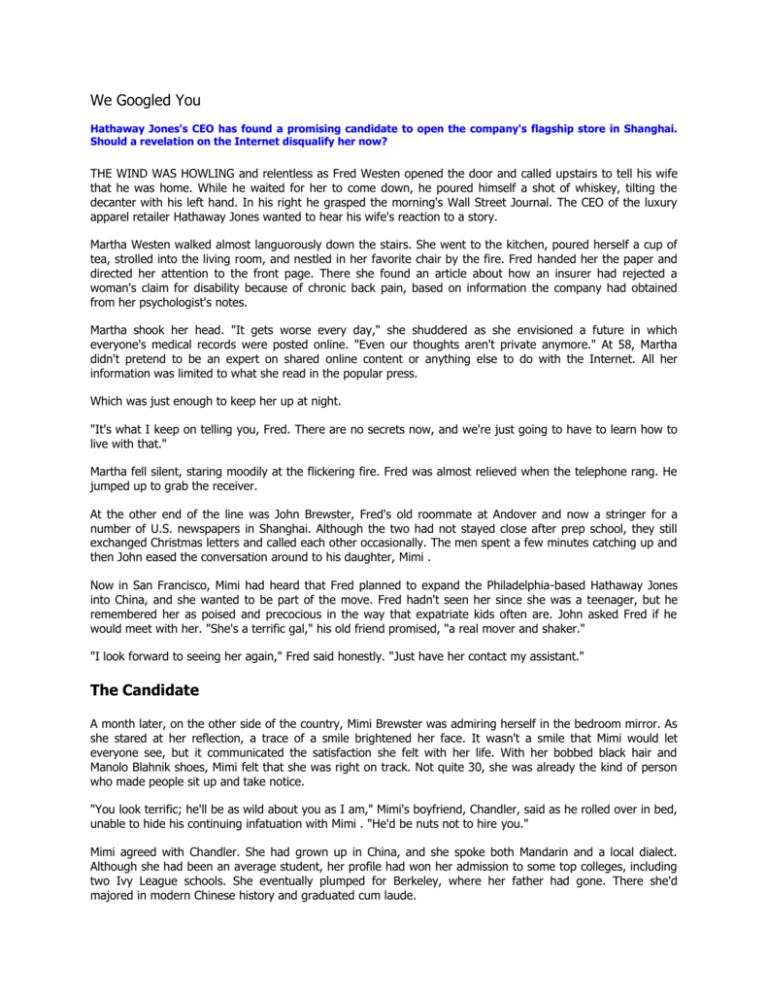
We Googled You Hathaway Jones's CEO has found a promising candidate to open the company's flagship store in Shanghai. Should a revelation on the Internet disqualify her now? THE WIND WAS HOWLING and relentless as Fred Westen opened the door and called upstairs to tell his wife that he was home. While he waited for her to come down, he poured himself a shot of whiskey, tilting the decanter with his left hand. In his right he grasped the morning's Wall Street Journal. The CEO of the luxury apparel retailer Hathaway Jones wanted to hear his wife's reaction to a story. Martha Westen walked almost languorously down the stairs. She went to the kitchen, poured herself a cup of tea, strolled into the living room, and nestled in her favorite chair by the fire. Fred handed her the paper and directed her attention to the front page. There she found an article about how an insurer had rejected a woman's claim for disability because of chronic back pain, based on information the company had obtained from her psychologist's notes. Martha shook her head. "It gets worse every day," she shuddered as she envisioned a future in which everyone's medical records were posted online. "Even our thoughts aren't private anymore." At 58, Martha didn't pretend to be an expert on shared online content or anything else to do with the Internet. All her information was limited to what she read in the popular press. Which was just enough to keep her up at night. "It's what I keep on telling you, Fred. There are no secrets now, and we're just going to have to learn how to live with that." Martha fell silent, staring moodily at the flickering fire. Fred was almost relieved when the telephone rang. He jumped up to grab the receiver. At the other end of the line was John Brewster, Fred's old roommate at Andover and now a stringer for a number of U.S. newspapers in Shanghai. Although the two had not stayed close after prep school, they still exchanged Christmas letters and called each other occasionally. The men spent a few minutes catching up and then John eased the conversation around to his daughter, Mimi . Now in San Francisco, Mimi had heard that Fred planned to expand the Philadelphia-based Hathaway Jones into China, and she wanted to be part of the move. Fred hadn't seen her since she was a teenager, but he remembered her as poised and precocious in the way that expatriate kids often are. John asked Fred if he would meet with her. "She's a terrific gal," his old friend promised, "a real mover and shaker." "I look forward to seeing her again," Fred said honestly. "Just have her contact my assistant." The Candidate A month later, on the other side of the country, Mimi Brewster was admiring herself in the bedroom mirror. As she stared at her reflection, a trace of a smile brightened her face. It wasn't a smile that Mimi would let everyone see, but it communicated the satisfaction she felt with her life. With her bobbed black hair and Manolo Blahnik shoes, Mimi felt that she was right on track. Not quite 30, she was already the kind of person who made people sit up and take notice. "You look terrific; he'll be as wild about you as I am," Mimi's boyfriend, Chandler, said as he rolled over in bed, unable to hide his continuing infatuation with Mimi . "He'd be nuts not to hire you." Mimi agreed with Chandler. She had grown up in China, and she spoke both Mandarin and a local dialect. Although she had been an average student, her profile had won her admission to some top colleges, including two Ivy League schools. She eventually plumped for Berkeley, where her father had gone. There she'd majored in modern Chinese history and graduated cum laude. She had parlayed her college experience into numerous job offers, finally accepting a position at a management consultancy, where she got the broad business exposure she wanted. Her career in motion, she applied to an MBA program two years later, choosing Stanford over Harvard because she felt that it was closer to the buzz. She was recruited after graduation by the West Coast regional office of Eleanor Gaston, the largest clothing, shoes, and accessories company in the United States. There, for the past four years, she'd shown a sharp eye for the capricious fashion tastes of the young, newly rich people in search of something to do with their dot-com money. Now, with two successful brand relaunches behind her, she was looking for some general management experience, preferably in a fast-growing market like China. Mimi walked over to the bed, sat down, and kissed Chandler playfully on the lips. "Don't waste the day chatting with your Facebook friends," she told him. "You've got to take Patapouf to the vet." Mimi's Siamese cat was famously ill-tempered, but he had attitude, and Mimi warmed to that. She picked up Patapouf and gave him a hug. Abruptly, she stood, straightened her Hathaway Jones interview suit, and said good-bye. All business now, she grabbed her bag, her BlackBerry, and her keys and ran out to catch the flight to Philadelphia. Bullish on a China Shop Fred left the house at 5:30 am every day for his office at 1 Constitution Road. He had a lot of work to do, and there was not a moment to waste. Despite sales of $5 billion in 2006, Hathaway Jones had fallen on hard times. Four years ago, the privately owned U.S. retail chain had recruited Fred because of his imposing credentials and a lifetime's experience of working with luxury brands and had charged him with waking up the company's sleepy, conservative stores. It hadn't been easy. Though aggressive outsourcing to suppliers in Mexico for some of the chain's lower-tier brands had helped bring the company's margins closer to industry standards, that was just a start. An avid consumer of his firm's marketing research, Fred knew that the company's image was getting old fast. Younger people across the United States, where Hathaway Jones had 144 shops and outlets, wanted more affordable clothing, with more flair. The trend was starting to show up in declining numbers for the company's high-priced -- some said stodgy -- designer clothes. Plans for radically revamping the company's image and product line were in the offing. Fred's biggest bet, however, was to elbow in on China's luxury goods market, which was growing by 70% a year. He had earmarked millions of dollars to open new stores in three of the largest cities, including Beijing and Guangzhou, with the flagship in Shanghai, China's wealthiest and most cosmopolitan city. With the plans in place, Fred was focused on selecting a winning team. "I wonder what Mimi's like now?" he asked himself, eyeing her CV. "Maybe there's a way I can fit her in. Doing a friend a favor and banking on a rising star -- who knows? This could be a twofer." The First Impression Mimi was Fred's last appointment of the day. "C'mon in!" he boomed, embracing her and inviting her to take a seat on the couch. Mimi looked around the corner suite and glanced at a lithograph of Hathaway Jones's first store, a draper's shop in Philadelphia. "You're the spitting image of your mother," Fred said, settling into his soft leather chair. "Tell me how she's doing." Mimi relayed how after almost 30 years of painting portraits, her mother had taken up fashion photography to capitalize on China's unprecedented interest in image and celebrity. "It's amazing how much appetite the new middle class has for fashion," Mimi commented. "Right," Fred said, adding that Chuppies -- China's yuppies -couldn't seem to get their hands on luxury goods quickly enough. "Absolutely!" she said, a little too abruptly. "Everybody knows that." Mimi fished around for insights that would make a smart impression on Fred. She knew that on the face of it, China seemed to be all about money. "But if you talk to senior executives in the big cities," she reported intelligently, "Confucianism comes up in every conversation." She said that the Chinese wanted to balance the intense materialism of the past two decades with some kind of spirituality and that Fred had better be prepared to deal with it. Mimi looked him squarely in the eye. Clearly, she wasn't expecting a handout. She wanted to be part of Hathaway Jones's plans to expand into China because she felt she deserved to be part of those plans. Indeed, she hoped to lead the team opening the flagship store on Nanjing Road -- Shanghai's version of Fifth Avenue. "A store is more than just the look and feel of a brand," she said knowingly. "It's a woman's fashion fantasy. I can help you create a fantasy to die for." Mimi talked about using ancient Chinese archetypes to bring the company's brand alive, and Fred was intrigued by the pitch. "I'll open the door for you and arrange some interviews," he said noncommittally, "but after that, you're on your own." Mimi winked. "Thanks, boss," she said, turning on her heel, confident that she was going to be a player at Hathaway Jones. Page Nine News Virginia Flanders, the vice president of human resources, was a lifer at Hathaway Jones, and as a member of the old guard, she had not been invited into Fred's inner circle. Indeed, the two of them had been at loggerheads about the way Fred brought together his top team. He ignored internal talent and downplayed the value of HR, relying overmuch, Virginia thought, on his sixth sense about who were the right people to bring on board. It was typical of the man, she reflected, that Fred spoke glowingly about Mimi after just one interview. As she put together a file on Mimi for the staff, Virginia had to concede that the candidate's letters of recommendation were impressive. Employers described her as aggressively creative, original, opinionated, and a risk taker -- perhaps a bit brash for Hathaway Jones, Virginia thought. She rounded out the file by running a routine Google search on Mimi . The first hits turned up a restaurant owner who shared Mimi's name. Virginia narrowed the search by adding a few parameters -- Berkeley, Stanford, and Mimi's employer. It was Virginia's practice to scan the first 11 pages of Google results, and on page nine she glimpsed something that might cause concern. A story in the November 1999 issue of the Alternative Review identified Mimi , fresh out of Berkeley, as the leader of a nonviolent but vocal protest group that had helped mobilize campaigns against the World Trade Organization. "That's odd," Virginia mused, deciding to key in "human rights" and "free trade" along with Mimi's name. She didn't expect to find much, but the search engine came up with several hits. It was soon clear that Mimi's involvement had been more than just a student's expression of defiance. One newspaper story featured a photo of Mimi sitting outside China's San Francisco consulate protesting China's treatment of a dissident journalist. Virginia had just clicked on another entry when a pop-up notified her of an e-mail from Fred, canceling their meeting for later that day. Groaning inwardly, Virginia typed a short message and hit the reply button. She was going to have to talk with Fred about this straightaway. Ex Post Facebook Fred was in the boardroom wrapping up a meeting with the senior executive team; Virginia waited a few moments, then walked in. He knew her well enough to see that whatever she had to say to him wasn't going to make him happy. "What's the problem, Virginia?" he asked as he snapped his binder shut. "I'm afraid we have something of a situation on our hands," she began, priding herself on her ability to remain objective. "I've been Googling Mimi Brewster, and I think there's something we might need to worry about." Virginia showed Fred printouts of the half-dozen or so articles she had found. Choosing her words carefully, she pointed out that Mimi could be the kind of person who could get the company into trouble in China. "For heaven's sake," Fred said, betraying his irritation. "Google anyone hard enough, and you'll find some dirt." Privately, however, Fred was relieved that Virginia hadn't turned up anything more recent than eight years ago -- and even more relieved that it wasn't a picture of Mimi half naked on MySpace, which could really embarrass Hathaway Jones. Fred's mind moved back in time, remembering the 1960s. "Let's face it," he thought a little defensively, he'd "not inhaled" just like the rest of his friends. Suddenly he felt a touch of paranoia -- or was it realism? He couldn't tell. "Let's get Mimi back in here to tell her side of the story," he said, looking up at Virginia. He knew enough about the Internet to understand that anyone could put information out there. Virginia blinked anxiously and suggested that Fred might first want to get some feedback from the company lawyers. She explained that they were studying the legal and privacy implications of Internet searching practices in an attempt to define an appropriate position for the company. "It's a bit risky letting her know that we're considering not hiring her because we Googled her," Virginia pointed out. "It might be safer just to back away before we get too involved." "Maybe," Fred conceded, acknowledging that he might need to rethink Mimi's candidacy. "But people with her credentials and references don't walk in the door of a company like ours every day. If she's swept up by the competition, there'll be hell to pay." The Decision Point "Watch out!" Martha shouted as Fred ignored a yield sign and veered toward an oncoming car. Martha and Fred were heading out for dinner in the city, but Fred's mind was a million miles away. "What's the matter?" she asked, trying not to sound intrusive. "Is it something we can discuss?" Fred put on his blinker to signal that he was turning left. He told Martha what HR had turned up about Mimi . "What am I supposed to do?" he brooded. "With everyone's sins out there on the Internet, fewer and fewer young people seem to be coming to us without any baggage." He turned on the car's defroster and loosened his tie. "Everyone is going to have to be a little more forgiving," he said. Martha was quiet for a few minutes as she tried to process the news. She didn't think anyone was going to just forgive and forget. "Internet postings are like tattoos," she said, ending the short silence. "They never go away. Sooner or later someone else will dig up this information, and if the wrong people get hold of it, your China plans will be derailed." Fred quickly glanced at her in surprise. He'd expected Martha to insist that he hire Mimi despite the discoveries. Martha grew impatient with Fred's naïveté. The genie was out of the bottle now. He needed to put business considerations ahead of any hesitation he felt about using information that turned up on the Internet. Fred looked away from Martha and turned the windshield wipers on high. Snow was falling fast and hard, and Fred felt strangely alone. "I don't know," he thought, flipping the argument back and forth. "The problem is that I have a responsibility to Hathaway Jones to hire the best people I can find. And how am I going to do that if I can only consider the ones who have always played it safe?" Should Fred hire Mimi despite her online history?
